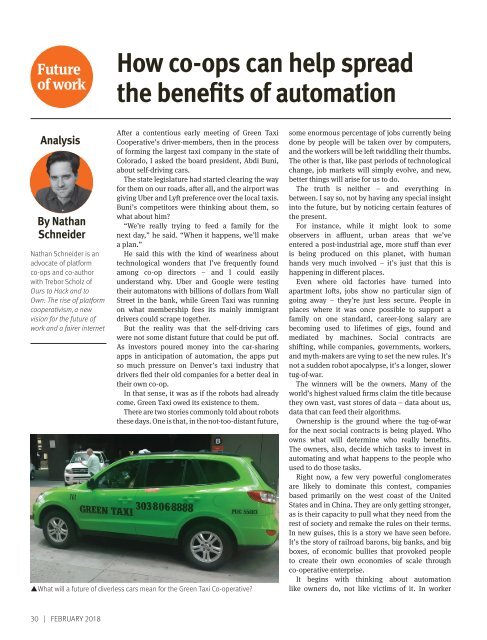FEBRUARY 2018
The February 2018 edition of Co-op News: connecting, challenging and championing the global co-operative movement. This issue looks at the challenges facing workers and co-ops in the context of the future of work. We also interview the International Co-operative Alliance's Ariel Guarco, look at the history of community business and get ready for Fairtrade Fortnight...
The February 2018 edition of Co-op News: connecting, challenging and championing the global co-operative movement. This issue looks at the challenges facing workers and co-ops in the context of the future of work. We also interview the International Co-operative Alliance's Ariel Guarco, look at the history of community business and get ready for Fairtrade Fortnight...
Create successful ePaper yourself
Turn your PDF publications into a flip-book with our unique Google optimized e-Paper software.
How co-ops can help spread<br />
the benefits of automation<br />
Analysis<br />
By Nathan<br />
Schneider<br />
Nathan Schneider is an<br />
advocate of platform<br />
co-ops and co-author<br />
with Trebor Scholz of<br />
Ours to Hack and to<br />
Own: The rise of platform<br />
cooperativism, a new<br />
vision for the future of<br />
work and a fairer internet<br />
After a contentious early meeting of Green Taxi<br />
Cooperative’s driver-members, then in the process<br />
of forming the largest taxi company in the state of<br />
Colorado, I asked the board president, Abdi Buni,<br />
about self-driving cars.<br />
The state legislature had started clearing the way<br />
for them on our roads, after all, and the airport was<br />
giving Uber and Lyft preference over the local taxis.<br />
Buni’s competitors were thinking about them, so<br />
what about him?<br />
“We’re really trying to feed a family for the<br />
next day,” he said. “When it happens, we’ll make<br />
a plan.”<br />
He said this with the kind of weariness about<br />
technological wonders that I’ve frequently found<br />
among co-op directors – and I could easily<br />
understand why. Uber and Google were testing<br />
their automatons with billions of dollars from Wall<br />
Street in the bank, while Green Taxi was running<br />
on what membership fees its mainly immigrant<br />
drivers could scrape together.<br />
But the reality was that the self-driving cars<br />
were not some distant future that could be put off.<br />
As investors poured money into the car-sharing<br />
apps in anticipation of automation, the apps put<br />
so much pressure on Denver’s taxi industry that<br />
drivers fled their old companies for a better deal in<br />
their own co-op.<br />
In that sense, it was as if the robots had already<br />
come. Green Taxi owed its existence to them.<br />
There are two stories commonly told about robots<br />
these days. One is that, in the not-too-distant future,<br />
pWhat will a future of diverless cars mean for the Green Taxi Co-operative?<br />
some enormous percentage of jobs currently being<br />
done by people will be taken over by computers,<br />
and the workers will be left twiddling their thumbs.<br />
The other is that, like past periods of technological<br />
change, job markets will simply evolve, and new,<br />
better things will arise for us to do.<br />
The truth is neither – and everything in<br />
between. I say so, not by having any special insight<br />
into the future, but by noticing certain features of<br />
the present.<br />
For instance, while it might look to some<br />
observers in affluent, urban areas that we’ve<br />
entered a post-industrial age, more stuff than ever<br />
is being produced on this planet, with human<br />
hands very much involved – it’s just that this is<br />
happening in different places.<br />
Even where old factories have turned into<br />
apartment lofts, jobs show no particular sign of<br />
going away – they’re just less secure. People in<br />
places where it was once possible to support a<br />
family on one standard, career-long salary are<br />
becoming used to lifetimes of gigs, found and<br />
mediated by machines. Social contracts are<br />
shifting, while companies, governments, workers,<br />
and myth-makers are vying to set the new rules. It’s<br />
not a sudden robot apocalypse, it’s a longer, slower<br />
tug-of-war.<br />
The winners will be the owners. Many of the<br />
world’s highest valued firms claim the title because<br />
they own vast, vast stores of data – data about us,<br />
data that can feed their algorithms.<br />
Ownership is the ground where the tug-of-war<br />
for the next social contracts is being played. Who<br />
owns what will determine who really benefits.<br />
The owners, also, decide which tasks to invest in<br />
automating and what happens to the people who<br />
used to do those tasks.<br />
Right now, a few very powerful conglomerates<br />
are likely to dominate this contest, companies<br />
based primarily on the west coast of the United<br />
States and in China. They are only getting stronger,<br />
as is their capacity to pull what they need from the<br />
rest of society and remake the rules on their terms.<br />
In new guises, this is a story we have seen before.<br />
It’s the story of railroad barons, big banks, and big<br />
boxes, of economic bullies that provoked people<br />
to create their own economies of scale through<br />
co-operative enterprise.<br />
It begins with thinking about automation<br />
like owners do, not like victims of it. In worker<br />
30 | <strong>FEBRUARY</strong> <strong>2018</strong>


















